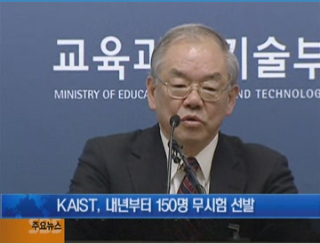policy
KAIST will select 150 students from regular high schools, excluding those from special purpose schools, on the basis of their principals" recommendations and interview results beginning in the next school year in an effort to diversify admissions, President Nam-Pyo Suh said on Thursday (March 5).
Award-winning records at math or science competitions will not be put into account in admissions to prevent after-school tutoring aimed at winning such contests.
President Suh unveiled the new admission plan at a news conference in Seoul. "We expect the principals to recommend students with special talents or potential rather than high grades," Suh said. Established under a special law in 1971, KAIST is given full liberty to recruit freshmen students in whatever method it deems right, without being required to use the scholastic ability test scores of applicants as the basic criteria.
KAIST plans to initially select 1,000 students across the country based on recommendations. Admission officers will single out 300 for further review. Out of the 300, the final 150 students will be chosen through in-depth interviews.
"Years of receiving principal recommendations would accumulate a database on high schools nationwide. If a student recommended by a principal turns out to be no good, we might not pick more students from that school," President Suh said.
Over 80 percent of students admitted to KAIST this year were graduates of elite institutions, mostly science high schools. Only 20 percent came from regular high schools. The 150 additional openings next year will be allotted to only those attending ordinary high school.
Ten percent of the 150 openings will be assigned to students from rural areas and another 10 percent will go to students from low-income households.
"One high school was not able to send even a single student to KAIST for the last 10 years. I"m sure there are talented students in that school. If we give the school a chance, the education system will be upgraded," President Suh said.
KAIST-affiliated Korea Science Academy, a Busan-based high school for gifted students, will also adopt similar admission policy of recruiting students solely on the basis on recommendation and interview results from 2011.

-
event KAIST School of Computing Unveils 'KRAFTON Building,' A Symbol of Collective Generosity
< (From the fifth from the left) Provost and Executive Vice President Gyun Min Lee, Auditor Eun Woo Lee, President Kwang-Hyung Lee, Dean of the School of Computing Seok-Young Ryu, former Krafton member and donor Woong-Hee Cho, Krafton Chairman Byung-Gyu Chang > KAIST announced on May 20th the completion of the expansion building for its School of Computing, the "KRAFTON Building." The project began in June 2021 with an ₩11 billion donation from KRAFTON and its employees, eventually gr
2025-05-21 -
event Life Springs at KAIST: A Tale of Two Special Campus Families
A Gift of Life on Teachers' Day: Baby Geese Born at KAIST Pond On Teachers' Day, a meaningful miracle of life arrived at the KAIST campus. A pair of geese gave birth to two goslings by the duck pond. < On Teachers' Day, a pair of geese and their goslings leisurely swim in the pond. > The baby goslings, covered in yellow down, began exploring the pond's edge, scurrying about, while their aunt geese steadfastly stood by. Their curious glances, watchful gazes, playful hops on water
2025-05-21 -
event KAIST Art Museum Showcases the Works of Van Gogh, Cy Twombly, and More at "The Vault of Masterpieces"
KAIST (President Kwang Hyung Lee) opened a special exhibition, "The Vault of Masterpieces", featuring the architects of the Gallerist Hong Gyu Shin, who is active in New York, on April 29th. Since its opening in December 2024, the KAIST Museum of Art, which has mainly exhibited works from its own collection, has boldly invited internationally renowned Gallerist Shin Hong-gyu to hold its first full-scale special exhibition, displaying a large number of his collections in the center of the camp
2025-04-30 -
event Formosa Group of Taiwan to Establish Bio R&D Center at KAIST Investing 12.5 M USD
KAIST (President Kwang-Hyung Lee) announced on February 17th that it signed an agreement for cooperation in the bio-medical field with Formosa Group, one of the three largest companies in Taiwan. < Formosa Group Chairman Sandy Wang and KAIST President Kwang-Hyung Lee at the signing ceremony > Formosa Group Executive Committee member and Chairman Sandy Wang, who leads the group's bio and eco-friendly energy sectors, decided to establish a bio-medical research center within KAIST and i
2025-02-17 -
research KAIST Develops Wearable Carbon Dioxide Sensor to Enable Real-time Apnea Diagnosis
- Professor Seunghyup Yoo’s research team of the School of Electrical Engineering developed an ultralow-power carbon dioxide (CO2) sensor using a flexible and thin organic photodiode, and succeeded in real-time breathing monitoring by attaching it to a commercial mask - Wearable devices with features such as low power, high stability, and flexibility can be utilized for early diagnosis of various diseases such as chronic obstructive pulmonary disease and sleep apnea < Photo 1. Fro
2025-02-13